A journey through the Bible's most miraculous turnarounds, uncovering the profound impact of eucatastrophes on faith and hope.
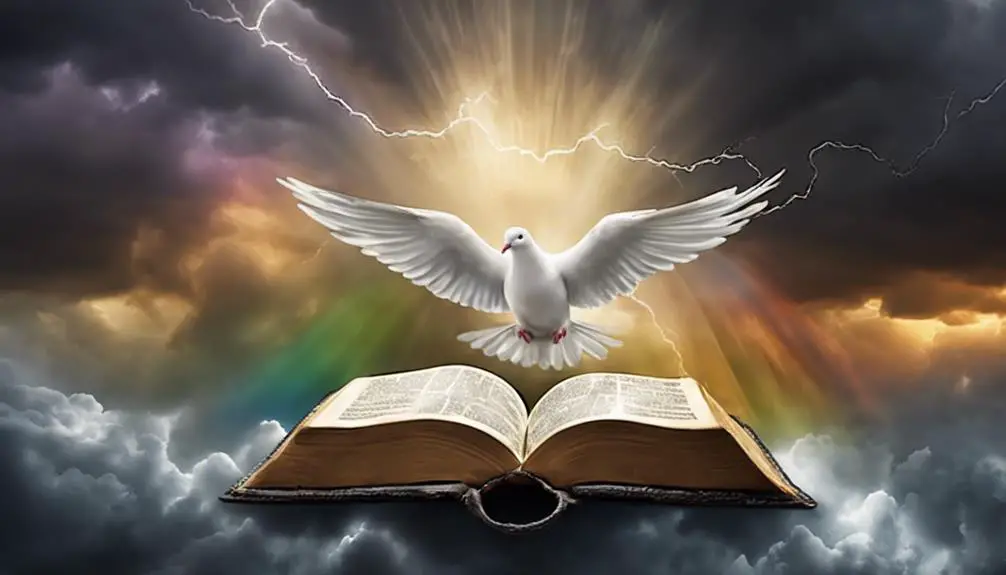
Eucatastrophe in the Bible
Imagine standing at the edge of a vast sea, the Egyptian army closing in, and suddenly, the waters part. This moment in the Bible is more than a miracle; it's a eucatastrophe, a sudden turn of events leading to a happy ending when all seems lost.
You've likely encountered these moments scattered throughout the scriptures, from Noah's Ark to the Resurrection of Jesus. Each story carries a weight of despair flipped miraculously into hope.
Let's explore how these pivotal moments not only shape the narrative but also offer deeper insights into the themes of faith, redemption, and divine intervention. Why do these stories resonate so profoundly across generations?
Key Takeaways
- Eucatastrophes in the Bible highlight moments of divine intervention that pivot towards hope and redemption.
- These biblical narratives underscore the resilience and survival of humanity through faith and divine protection.
- Symbolism within these stories, like the Rainbow Covenant and the parting of the Red Sea, represents promises of transformation and renewal.
- The resurrection of Jesus serves as the ultimate eucatastrophe, altering the spiritual landscape and offering a gateway to new life.
The Genesis Flood: Noah's Ark
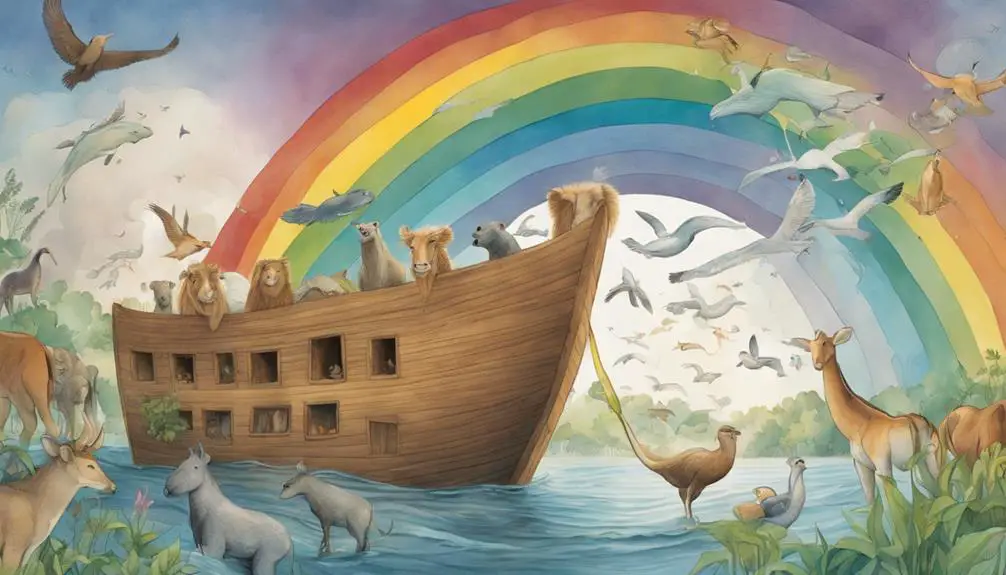
In analyzing the Genesis Flood narrative, one finds that Noah's Ark serves as a pivotal eucatastrophe, showcasing divine intervention that spares humanity from total annihilation. This event stands not only as a testament to survival and resilience but also illuminates the meticulous planning and execution involved in the animal gathering process. You're drawn into a world where every species must be preserved, reflecting a divine mandate for biodiversity and balance within creation.
The aftermath of the flood introduces you to the Rainbow Covenant, a symbol of hope and a promise that life, once nearly obliterated, will endure. This covenant isn't merely a pact between the divine and humanity; it's a broader assurance that the earth itself, with all its inhabitants, won't face such devastation again. Through this narrative, you're invited to appreciate the depths of mercy and foresight encapsulated within this divine intervention.
The story of Noah's Ark, with its emphasis on salvation, preparation, and covenant, isn't just a tale of survival. It's a profound exploration of divine grace acting within the darkest moments, ensuring the continuity of life on Earth.
Joseph's Rise in Egypt
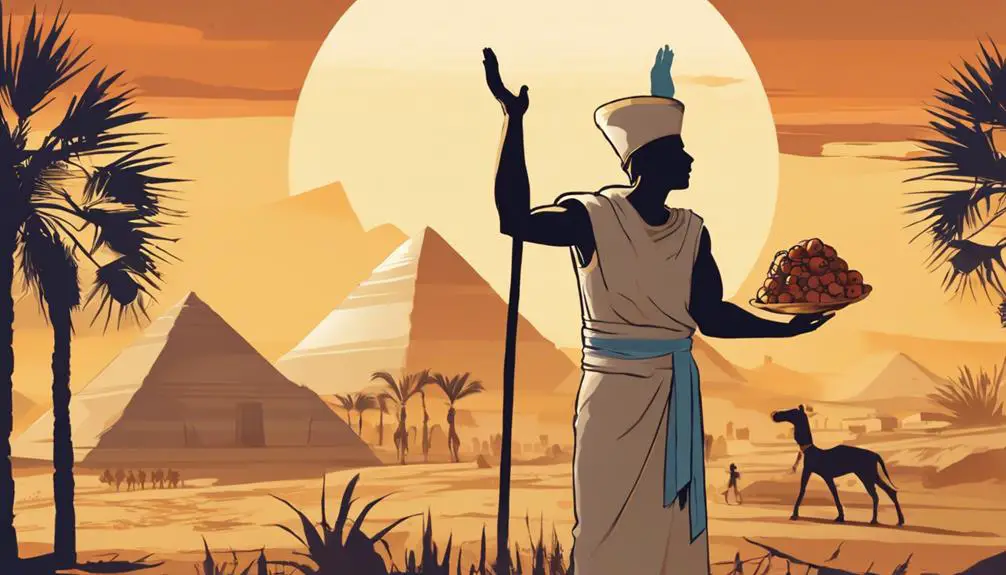
Shifting our focus from the divine preservation evident in Noah's Ark, we encounter another profound instance of eucatastrophe through Joseph's rise to power in Egypt, an event that not only saves an emerging nation but also redefines the concept of providence and foresight in biblical narratives. Initially sold into slavery by his brothers, Joseph's journey is marked by hardship and injustice. However, his ability to interpret dreams becomes the key to his unforeseen elevation to Pharaoh's right hand, illustrating the unpredictable nature of divine intervention.
Joseph's skill in dream interpretation not only secures his rise but also positions him as a pivotal figure in the survival of his family and the Egyptian populace during a devastating famine. This narrative arc demonstrates the interplay between individual gifts and divine providence, suggesting that personal abilities can serve broader, divinely orchestrated purposes.
Moreover, Joseph's eventual brotherly reconciliation highlights a theme of forgiveness and restoration, integral to the concept of eucatastrophe. His decision to forgive his brothers, despite their betrayal, underscores the transformative power of grace and reconciliation within the framework of providential deliverance. Through Joseph's story, the biblical narrative emphasizes the importance of foresight, forgiveness, and the redemptive potential of unforeseen grace.
Deliverance at the Red Sea
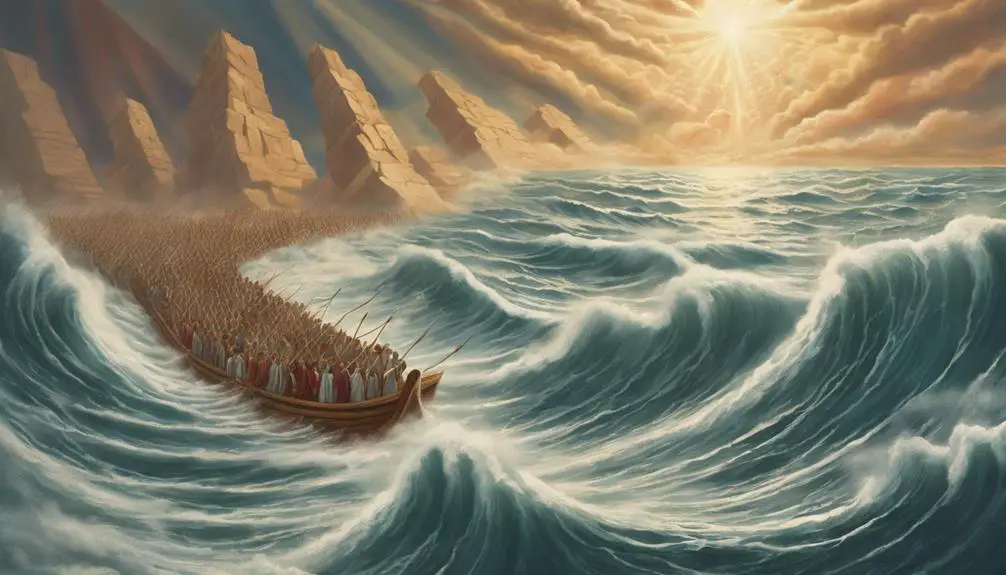
Another pivotal moment of eucatastrophe in the Bible occurs during the deliverance at the Red Sea, where the Israelites' escape from Egyptian pursuit showcases divine intervention at its most dramatic. Under Moses' leadership, the Israelites face what appears to be an insurmountable obstacle: the Red Sea. Behind them, Pharaoh's defiance fuels his army's chase, determined to recapture the fleeing Israelites. This moment is critical, highlighting not just a physical but also a spiritual crossing from slavery into freedom.
- Moses' leadership: Moses stands as a mediator between God and the Israelites, embodying faith and obedience amidst despair.
- Pharaoh's defiance: His hardened heart exemplifies the ultimate resistance against divine will, setting the stage for his downfall.
- Divine intervention: The parting of the Red Sea serves as a miraculous sign of God's power and protection over His chosen people.
- Transformational journey: This event marks the beginning of the Israelites' transformation from a state of bondage to a community under divine guidance.
Analyzing the deliverance at the Red Sea reveals profound insights into the nature of faith, leadership, and the dynamics of divine intervention. Moses' unwavering leadership, in the face of Pharaoh's defiance, showcases the power of steadfast faith against seemingly impossible odds.
Daniel in the Lion's Den
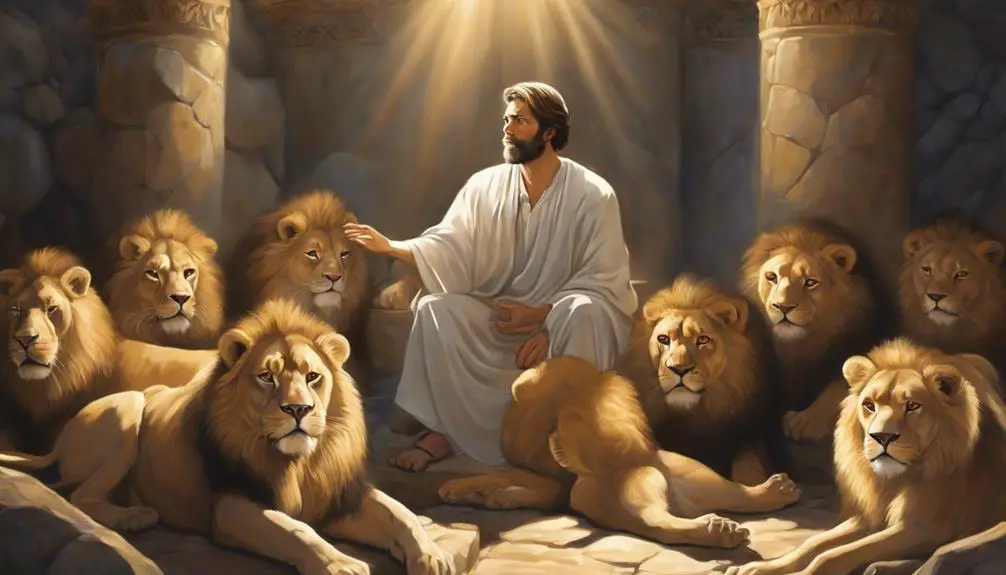
Moving from the miraculous deliverance at the Red Sea, we now examine the story of Daniel in the Lion's Den, a narrative that further explores the theme of divine intervention amidst human adversity. This account, found in the Hebrew Bible, portrays Daniel, a man of unwavering faith, who's thrown into a den of lions as a consequence of his steadfast devotion to God, despite a royal decree that forbids prayer to any deity or man other than the king.
Analyzing this story, you'll notice that Daniel's faith doesn't waver; he continues his practice of prayer, fully aware of the potential consequences. This lion's faith in the face of certain death underscores the narrative's tension between human loyalty to divine commands and the earthly laws that challenge such allegiance.
The den's miracle, where Daniel emerges unscathed, serves as a poignant demonstration of divine protection and intervention. It's not merely a tale of survival but a profound testament to the power of faith and the reality of eucatastrophe—where a seemingly inevitable disaster is suddenly and unexpectedly averted through a higher power's direct involvement.
This story, like that of the Red Sea, invites reflection on the nature of faith, the power of divine intervention, and the strength found in unwavering conviction amidst trials.
The Resurrection of Jesus
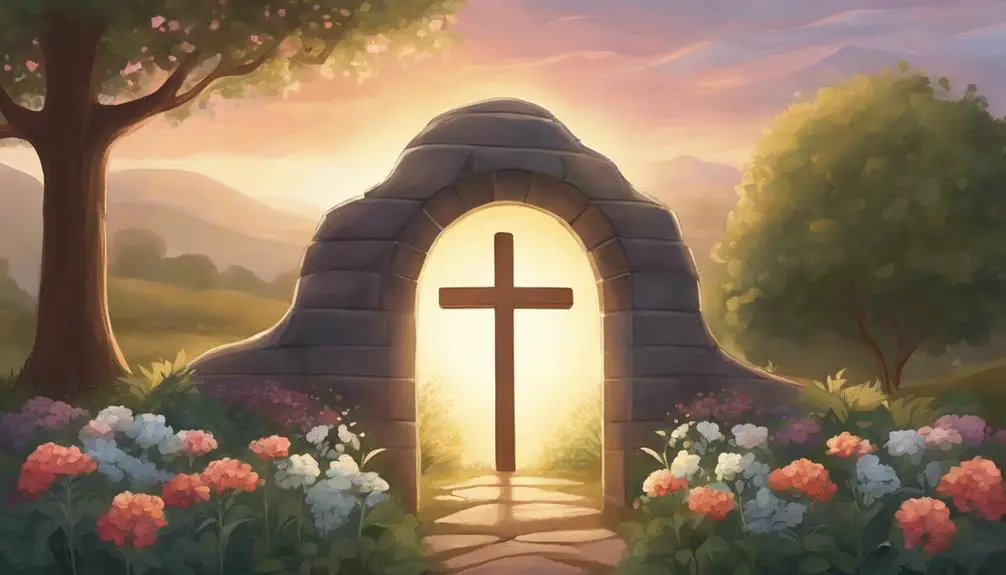
The Resurrection of Jesus, a cornerstone event in Christian theology, epitomizes the ultimate eucatastrophe by demonstrating how, in the face of humanity's ultimate adversary—death—a divine intervention not only averts disaster but also inaugurates a new era of hope and salvation. This miraculous event signifies not just a triumph over physical death, but also a profound moment of spiritual renewal for believers.
To understand the depth of this event, consider the following:
- Defeat of Death: The Resurrection underscores the defeat of death, presenting it not as an end, but a transition into a new form of life.
- Foundation of Christian Faith: It serves as the bedrock of Christian faith, affirming Jesus' divinity and the truth of his teachings.
- Symbol of Hope: This event acts as a universal symbol of hope, suggesting that despair and defeat can be overcome with faith and divine support.
- Gateway to Spiritual Renewal: It offers believers a path to spiritual renewal, emphasizing the possibility of transformation and redemption.
Analyzing the Resurrection from this perspective reveals its significance as a miraculous event that not only altered the course of religious history but also offered a new paradigm for understanding life, death, and the possibility of rebirth through spiritual renewal.
Frequently Asked Questions
How Does the Concept of Eucatastrophe Contrast With the Idea of Divine Punishment in the Biblical Narrative?
You're exploring how sudden, positive turns in stories contrast with themes of divine wrath in biblical tales. Essentially, while divine punishment follows a narrative structure of consequence for actions, eucatastrophe breaks this flow with unexpected salvation.
This contrast highlights a complex interplay between justice and mercy within these texts. It invites a deeper reflection on the nature of redemption and the unpredictability of divine intervention in the unfolding of biblical stories.
Can Eucatastrophe Be Found in the Lives of Biblical Figures Not Typically Associated With Triumphant Outcomes, Such as Job or Jonah?
You're exploring if unexpected positive turns, like Jonah's transformation and Job's restoration, occur in stories of biblical figures not famously victorious. This angle considers these narratives beyond their usual framing, analyzing how sudden, favorable changes might align with or diverge from traditional interpretations.
How Does the Theme of Eucatastrophe in the Bible Influence Its Theological Implications, Especially Regarding the Nature of God's Grace and Mercy?
You're exploring how sudden turns from despair to hope in narratives influence your understanding of divine compassion. This theme reshapes your perception of mercy and the dynamics of grace. It suggests that, despite appearances, benevolence underpins existence.
Your analysis reveals a theological dimension where grace isn't just an abstract concept but an active, transformative force, embodying a profound belief in an underlying, benevolent purpose in the cosmos.
In What Ways Do Non-Biblical Religious Texts and Traditions Incorporate the Concept of Eucatastrophe, and How Do These Compare With Biblical Instances?
You'll find that non-biblical religious texts and traditions weave in the concept of eucatastrophe, showcasing mythological parallels and cultural interpretations. These narratives, from ancient myths to modern-day folklore, often highlight sudden, positive turns in dire situations, mirroring biblical stories.
Analyzing these instances, you'll notice how they reflect a universal theme of hope and redemption, although they might interpret divine intervention and the nature of mercy differently, offering a broad spectrum of theological insights.
How Have Modern Interpretations and Adaptations of Biblical Stories (In Literature, Film, or Art) Utilized or Altered the Concept of Eucatastrophe to Fit Contemporary Contexts and Sensibilities?
You've noticed that modern retellings of biblical stories, whether in literature, film, or art, often take artistic liberties to adapt the concept of eucatastrophe.
This adaptation aims to resonate with contemporary contexts and sensibilities. By tweaking the narratives or outcomes, creators infuse a modern perspective into ancient tales, making them more relatable or offering new insights.
This approach ensures these stories maintain their relevance and emotional impact in today's world.
Conclusion
In conclusion, the concept of eucatastrophe, as observed in these biblical narratives, underscores a thematic cornerstone of divine intervention and redemption. These stories, from Noah's Ark to the Resurrection of Jesus, encapsulate moments where despair is overturned by hope through miraculous deliverance.
They exemplify a theological perspective that posits suffering and peril as preludes to salvation, reinforcing the biblical motif of faith's triumph over adversity.
This analysis reveals the intricate weaving of eucatastrophe throughout sacred scripture, highlighting its pivotal role in theological discourse.

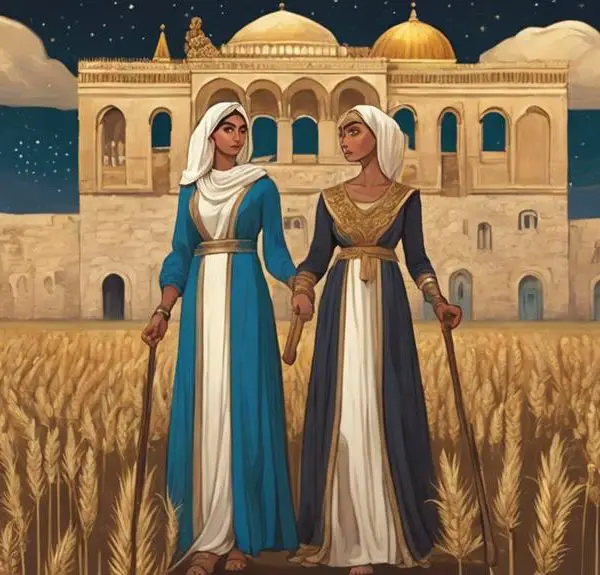
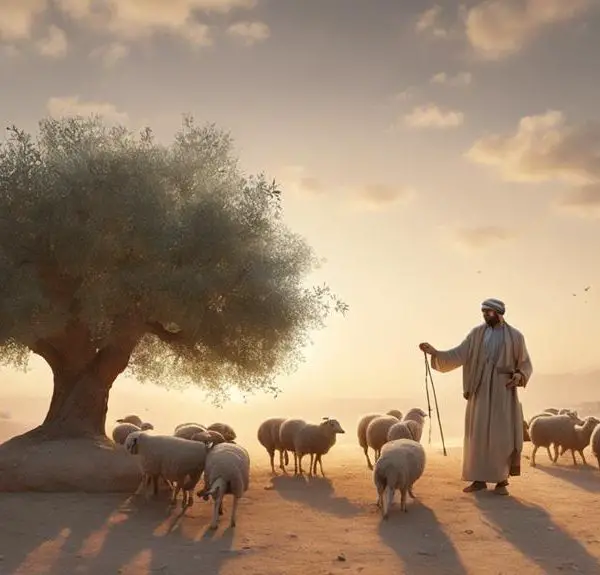
Sign up